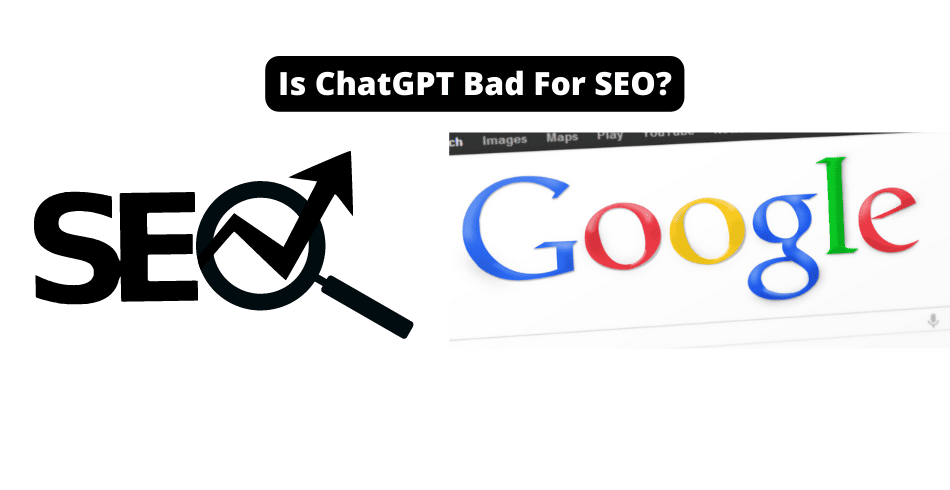Wow, so who hasn’t heard of ChatGPT by now?
This human-like artificial intelligence system seems to have unlimited data and can seemingly answer any query.
While the world seems to marvel at OpenAI’s new language processing tool, others are freaking out, wondering if this is bad for SEO
Well, it’s kind of a dual-sided subject.
ChatGPT is a powerful tool that will improve SEO in the short term as it increases the number of pages available on search engines, thereby serving more users with better results. However, this could become a problem in the long term, as once most content is generated through AI, there will be no new data for the AI to learn from as it’s just scraping data generated by itself.
Outside of “Macro-SEO,” we have “Micro-SEO” (I just made those terms up) – where we have creators at the individual level wondering if they should implement ChatGPT into their content strategy.
While we have seen some search engines penalize content generated by ChatGPT, we will show you how you can take advantage of this large language model without putting your website at risk.
To truly understand whether ChatGPT is bad for SEO, you’ll need to give us a bit longer to explain some of the nuances.
We’ll explore how ChatGPT affects SEO and how companies can use it without being penalized by search engines.
I promise you’ll love this one.

Is ChatGPT Bad For SEO?
ChatGPT is not bad for SEO or your blog when used correctly.
Before diving deep into this topic, we must first define a couple of things.
When we say SEO, we usually just mean ranking for keywords on Google with your content (Which owns about 97% market share on search).
So, when referencing SEO, we’re talking about ranking on Google, as building a content strategy for any other search engine (again, due to the market share) doesn’t make sense.
Okay, now, with that out of the way.
Google recently came out about AI-generated content, and to summarize it in one sentence from their post, “Rewarding High-quality content; however, it is produced.”
(Check it out) https://developers.google.com/search/blog/2023/02/google-search-and-ai-content
We can see that Google does not want to penalize your content, and their activities focus on two things, high-quality content and a thing called E-E-A-T.
How Does Google Define High-Quality Content?
I’ll be honest; high-quality content is seemingly impossible to define for SEO and Google.
And it makes sense that it’s super hard to define; it’s the same as trying to determine “What good food is.”
(You can’t, and it’s complicated).
So while we don’t have a formal definition, what we do have is a list of questions from google itself.
Let’s see if we can break these down.
When generating quality content, ask:
1.) Does the content provide the user with original information, reporting, research, or analysis?
This one is pretty simple. Did you actually research the topic, or did you just copy other blogs?
2.) Does the content provide a substantial, complete, or comprehensive description of the topic?
Google has an idea of what should be covered in an article. Did you cover these core topics?
3.) Does the content provide insightful analysis or interesting information beyond the obvious?
When you did your research, did you find those “small details” that make it worth reading?
4.) If the content draws on other sources, does it avoid copying or rewriting those sources and provide substantial additional value and originality instead?
Did you plagiarize?
5.) Does the main heading or page title provide a descriptive, helpful content summary?
Are you just using clickbait, or are you actively answering questions?
6.) Does the main heading or page title avoid exaggerating or being shocking in nature?
Again, another pushback against clickbait.
7.) Is this the sort of page you’d want to bookmark, share with a friend, or recommend?
Was the writing good?
8.) Would you expect to see this content in or referenced by a printed magazine, encyclopedia, or book?
Was the writing so good that someone else would link to it?
9.) Does the content provide substantial value when compared to other pages in search results?
Is it better than the other ten articles on the first page for this search?
We quickly notice that there is nothing about AI, ChatGPT, GPT-3, etc.

When using these AI tools to generate text for your website, ask yourself the questions above about the content, and if you fully believe you can confidently answer “yes” to all of them, you should have 0 problems regarding quality content.
How Does Google Define E-E-A-T?
While high-quality content is hard to define, E-E-A-T is not.
E-E-A-T simply stands for Experience, Expertise, Authoritativeness, and Trust.
Let’s break each of these down.
Experience is pretty obvious; have you actually experienced what you’re talking about?
For example, if you’re writing about riding your bike to the grocery store, have you actually ever ridden your bike to the grocery store?
If not, why are you writing about it?
Expertise is a little bit harder to define but can be thought of simply as “has the person ascended past the beginner stage of whatever topic they’re writing about.”
If we leverage the example above, has this person been riding bikes for longer than two weeks? Does this user have any certifications or degrees in this topic?
Authoritativeness can simply be thought of as the stance you take on the topic or keyword.
Are you actually giving advice or informing, or are you stuck in the middle?
Again, to leverage the example above, are you definitive in your advice, or do you constantly flip-flop back and forth between a couple of ideas?
Generally, if you’re flip-flopping with advice, Google seems to see this as an indicator of not really knowing enough to be an expert on the topic.
And finally, Trust.
Can the readers trust you? Are your intentions good?
If your story is about how to ride your bike to the grocery store, did you only write this article so you could link your affiliate link to the local bike store?
Or did you actually write this piece to inform the user?
How These Two Tie Back Into ChatGPT
If we notice anything from the two above, it’s much less about how the content was created and more about the quality of both the content and the writer.
Therefore, if you want to use ChatGPT successfully for SEO purposes, you need to
- Ensure the content created for you by AI is high-quality and meets each and every one of Google’s high-quality content questions above.
- It is fact-checked; Generative text adds false facts or made-up stories to their queries.
- You can display E-E-A-T on the topic. While ChatGPT doesn’t understand anything about SEO – You do.
ChatGPT can be an excellent tool for SEO when appropriately used, as long as you are willing to put in the effort needed to ensure the quality of your content remains high.

Reference:
https://developers.google.com/search/docs/fundamentals/creating-helpful-content
Should You Use ChatGPT For SEO?
Using ChatGPT for SEO can be a great tool when used correctly.
It should not be used as a crutch to cover up poor E-E-A-T but rather as a way to enhance the value of good content.
When using ChatGPT for SEO, it is vital to ensure that your content still passes Google’s guidelines and indicates that this article was AI-generated.
Honestly, If your content is high quality and passes Google’s standards, there is really no reason not to use ChatGPT for SEO purposes.
The advantages of using this technology are numerous, including more efficient keyword optimization and improved user engagement due to the natural language processing capabilities.
ChatGPT can help you stay ahead of the competition by providing valuable insights into trends and topics that are trending in your industry.
Does Google penalize AI content?
Google does not outright penalize AI content, but according to their guidelines, the use of AI content should be indicated in the post.
This means that when content is generated via these new and exciting content writing tools, it should be made clear to readers that this has been done.
Despite this, AI content must meet E-E-A-T (Experience, Expertise, Authoritativeness, and Trustworthiness) guidelines and be high-quality.
Google may take action if the quality of AI-generated content does not meet its standards; for example, if it contains irrelevant or inaccurate information.
And trust me, when google takes action, your blog will basically disappear.
Due to some nuances with artificial intelligence, it can actually be pretty tricky for Google to determine if a piece of content was created manually or by an algorithm.
As such, they may take a closer look at posts utilizing AI technology and judge them on a case-by-case basis.

Read the guidelines here:
https://developers.google.com/search/docs/fundamentals/creating-helpful-content
Is AI content, in general, good for SEO?
While every SEO expert is screaming that Artificial Intelligence content can be good for SEO… I believe this is true only to a certain degree.
While AI-generated content can help optimize a website and build out a content strategy very quickly, it cannot replace human-written content in terms of quality, accuracy, and that human element.
I’m pretty nervous about Long-term generative text.
Simply, these tools are particularly bad for SEO because it lacks the relevancy and originality that search engines prefer.
But we know from above that these gaps can be closed with some editing.
What I am worried about is the long-term effectiveness of the internet. Once the internet becomes no longer human-written, I fear these tools will degrade in quality.
Think about it, these AI companies scrape the internet, create a dataset, and feed it to the model.
Eventually, these AI companies will be scraping data generated by the algorithms themselves, creating a dataset from itself, and training on data produced by itself.
What happens when that data is wrong?
And what happens to the quality of the internet and the flow of information then?

Other ChatGPT Articles
We know that ChatGPT has taken the world by storm. And by doing this, it’s also created a TON of confusion.
Don’t worry; we have some guides to help you.
- What HR software does Coca-Cola use? [Unlock the Secrets!] - February 19, 2026
- Can I use Samsung T7 without software? [Boost Your Performance Now] - February 18, 2026
- Improving Packaging Efficiency: Tailored Best Practices [Boost Your Business Now] - February 18, 2026

